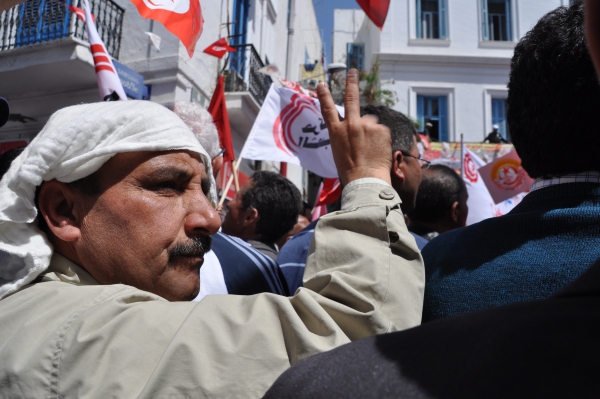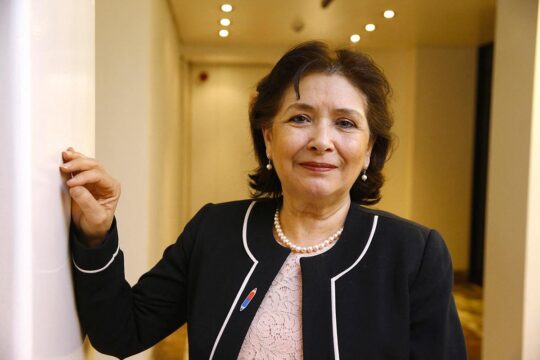The news was unexpected. Just the day before, a member of parliament from the majority Nidaa Tounes party had a miraculous escape from assassination in a country where terrorist violence and arrests of Jihadist group members have become a daily occurrence. The Jihadist attack in Sousse this summer, the worst in Tunisian history, left 39 foreign tourists dead. Tunisia is also reeling from statements by journalist Moez Ben Gharbia, exiled in Switzerland since last Saturday, who threatened on Facebook to reveal the identities of people behind the assassinations of political leaders Chokri Belaid (killed in February 2013) and Mohamed Brahmi (killed in July 2013). He claimed the perpetrators were “men belonging to a major political party following orders from a nebulous Arab source”.
It was in this context came the news that Tunisia’s Quartet, composed of labour unions, employers, lawyers and human rights activists, has been awarded the Nobel Peace Prize for helping the country’s democratic transition.
Four organizations initiate National Dialogue*
The story dates back to the murderous summer of 2013. On July 25, nationalist MP Mohamed Brahmi was assassinated. Opposition MPs froze their activities, demanded the dissolution of the Constituent National Assembly (ANC) and the government. Four days later, eight soldiers were killed by a death squad belonging to a jihadist group hidden in the Mont Chaâmbi mountains. The ANC president decided on August 6 to suspend the drafting of a new Constitution which was proving long and “divisive”. There was trouble in the streets and the spectre over Tunisia of another “Arab Spring” country, Egypt, which fell on July 6 to army officer Sissi.
The situation of zero political visibility threatened the whole democratic transition. It was at that point the UGTT labour union, founded in 1946 by nationalist leader Farhat Hached and enjoying considerable historic credibility, proposed to political adversaries trapped in divisive politics a “roadmap” which would allow “a national dialogue to end the crisis”.
On July 29, the UGTT issued a statement denouncing the “failure of the troika [Islamists of Ennahdha, Congress for the Republic of then-president Marzouki and the Ettakatol party] in ensuring security, erosion of the ANC’s credibility and increasing poverty of the middle classes”.
The UGTT was quickly joined by the National Order of Lawyers (ONA), the Tunisian Human Rights League (LTDH) and, to everyone’s surprise, even the employers’ organization UTICA. Thus the Quartet was born.
Roadmap
The roadmap proposed by the Quartet in September 2013 laid out a working method, proposed new political ethics and set deadlines on the way to transition. Centrist in its orientations, it proposed steps leading to legislative and presidential elections to end the “provisional” system that had left post-revolution Tunisia in crisis and uncertainty. The first step was to organize adoption of a new Constitution.
The road map set the ANC a deadline of three weeks to adopt the basic text, and proposed creation of an expert committee to revise the controversial June 2013 draft Constitution. Its second step was to dissolve the “troika” and replace it with a government of “technocrats”. And the third proposed step was elections. The ANC was to set up an independent electoral commission, adopt the electoral law and set an election calendar.
“We will find a way”
The roadmap set tough deadlines. The Quartet, proclaiming itself to be the body of arbitration and mediation in an apparently dead-end conflict, more or less took over the management of the country. “As of August 2013, the authorities more or less ignored the Assembly and put itself in the hands of the Quartet,” says opposition Assembly member Fadhel Moussa. “The law so far dictated by the Islamists in the ANC no longer ruled.”
Nevertheless, at the end of summer 2013 it still seemed unlikely that Islamists of the Ennahdha movement that had governed the country since December 2011 following elections on October 23, would agree to leave power. The war of deadlines was at its height and the population were more and more tired of politics.
A National Dialogue nevertheless opened on October 5 in Tunis. Thanks to the mediation and negotiation skills of the Quartet, the Road Map was finally signed by 21 parties, including Ennahdha.
This kind of initiative, launched in summer 2013 despite everything, pushes fierce political opponents to accept each other, discuss together and come to an agreement. This is a dynamic that can give new direction to a country still on the edge. And it reminds us of Phoenician general Hannibal who said, when crossing the Alps, “we will find a way, and if not, we will create one”.
By giving a second and perhaps last chance to the political transition, the Quartet started something new in Tunisia. “The idea is that from now on, a single force can no longer govern the affairs of the country alone,” says historian Kmar Bendana. “Through the National Dialogue, we have experienced the first steps of democracy, its conception and its first attempt at realization.”
Presidential and legislative elections were held freely and fairly at the end of 2014. According to international media, Tunisia reclaimed its position as an “exception” in a troubled Arab world.
*Certain passages of this article are drawn from a book under publication on the Tunisian transition by Olfa Belhassine and Hedia Baraket entitled “New references in a new Tunisia” (Editions Cérès, Tunis, 400 pages).






